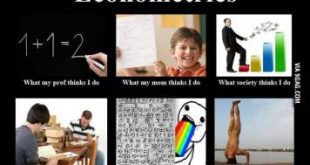from Lars Syll There seems to be a pervasive human aversion to uncertainty, and one way to reduce feelings of uncertainty is to invest faith in deduction as a sufficient guide to truth. Unfortunately, such faith is as logically unjustified as any religious creed, since a deduction produces certainty about the real world only when its assumptions about the real world are certain … Unfortunately, assumption uncertainty reduces the status of deductions and statistical computations to...
Read More »Weekend Read – The puzzle of western social science
from Asad Zaman 1 GENERALIZATIONS FROM EUROPEAN HISTORICAL EXPERIENCE? Introduction: Briefly, we can state the puzzle as: “Why does Social Science claim to be UNIVERSAL, when it is based on analysis of European historical experience?”. Many authors have recognized this problem, which manifests itself in many ways. For example, Timothy Mitchell (2002) writes: “The possibility of social science is based upon taking certain historical experiences of the West as the template for a...
Read More »Free trade and free taxes: How our intellectuals help the rich
from Dean Baker Since I came to Washington in 1992, I have been working alongside friends in the policy community, labor movement, and community organizations in fighting against a series of trade pacts. NAFTA was the immediate issue in 1992, but a couple of years later we had the Uruguay Round of the GATT that created the WTO. At the end of the Clinton administration, we had China’s admission to the WTO and then various other smaller pacts. Those of us who opposed these deals (which were...
Read More »The crooked timber of history
from Peter Radford I was lucky enough last week to meet a few friends for the first time in person since the pandemic swept all before it. We are an eclectic group with more than a fair influence of Wall Street. Given all that is going on, and has gone on since we last met face-to-face, I expected to be drawn into endless political discussions. But no, we spent a majority of our time talking about how the pandemic has accelerated the current wave of technological change. At one point...
Read More »The methods economists bring to their research
from Lars Syll There are other sleights of hand that cause economists problems. In their quest for statistical “identification” of a causal effect, economists often have to resort to techniques that answer either a narrower or a somewhat different version of the question that motivated the research. Results from randomized social experiments carried out in particular regions of, say, India or Kenya may not apply to other regions or countries. A research design exploiting variation across...
Read More »Econometrics versus reality
from Asad Zaman Underlying Philosophy of Science Many important structures of the real world are hidden from view. However, as briefly sketched in previous lecture on Ibnul Haytham: First Scientist, current views say that science is only based on observables. Causation is central to statistics and econometrics, but it is not observable. As a result, there is no notation available to describe the relationship of causation between two variables. We will use X => Y as a notation for X...
Read More »Quick, how much is $2 trillion?
from Dean Baker Okay, it is more money than even Bill Gates, Elon Musk, and Jeff Bezos have, put together. That probably still doesn’t give people too much information, since most people don’t have much familiarity with these folks fortunes. But it might be helpful if the media made some effort to put the proposed spending in President Biden’s infrastructure package in a context that would make it meaningful. The spending is supposed to take place over eight years, which means that it...
Read More »Why do economists never mention power?
from Lars Syll The intransigence of Econ 101 points to a dark side of economics — namely that the absence of power-speak is by design. Could it be that economics describes the world in a way that purposely keeps the workings of power opaque? History suggests that this idea is not so far-fetched … The key to wielding power successfully is to make control appear legitimate. That requires ideology. Before capitalism, rulers legitimised their power by tying it to divine right. In modern...
Read More »Inflation: who matters?
from Peter Radford There are times when you really don’t need to say much. The facts make the argument for you. At such times all that matters is that the largest number of people are aware of those facts and that at least some of them speak to the issues raised. So too is with a small snippet of news I saw this morning. I came to it via the New York Times. The original report being in Business Insider. Apparently Wall Street bonuses have risen 1,217% since 1985. Quite what the...
Read More »HUGE NEWS! – Kalle Sauerland on deal with Wasserman Boxing | Sky Sports, Barry Hearn Comments & WBSS
Boxing Social's Rob Tebbutt spoke to Kalle Sauerland and Dean Baker of Wasserman Boxing following the announcement of a merger between Team Sauerland and Wasserman... ? BETFRED | Not Suitable for Minors | Please Gamble Responsibly | https://www.begambleaware.org/NGTS.html ? ? | SUBSCRIBE: https://www.youtube.com/channel/UCZEOvoFUl6pkx7rts8KKkhw?sub_confirmation=1 ? - FOLLOW BOXING SOCIAL ON SOCIAL MEDIA... ? ? - TWITTER: https://twitter.com/boxing_social ? - FACEBOOK:...
Read More » Real-World Economics Review
Real-World Economics Review




